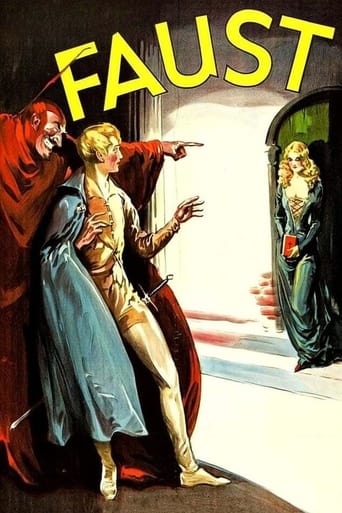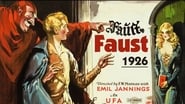Horst in Translation ([email protected])
"Faust" is a German silent movie from almost 90 years ago. Of course it is also still in black and white and the runtime differs depending on what version you have. The original ran for 85 minutes roughly, but the new restored version almost reaches the two-hour mark. In that case, it's not a good thing. The film drags a lot on several occasions and even if Goethe's story of Faus is a truly interesting one that I also enjoyed reading when we did it at school, it's just not enough material for a 120-minute film, at least not in this version. The director was Friedrich Wilhelm Plumpe, more known as Murnau, who worked on several of the most successful German silent films in the early days of movie-making and was probably second only to Fritz Lang at that point here in Germany. Murnau was a combat pilot in World War I by the way and no less than 6' 11" tall.Anyway, back to this film: The lead actor is a Swede that I have to say I am not familiar with. Jzst like Murnau, he died way too early. Emil Jannings plays the devilish character of Mephisto and he won the very first Academy Award not much later. The lead actress is the pretty (and) young Camilla Horn who enjoyed a prolific movie career in many decades after this one, especially the 1920s, 1930s and 1940s. And even if the trio did a decent job with their performances and certainly elevated the material, it is not enough to make up for the flaws of this film. All in all, not recommended.
Ryan F
I saw Faust last night at a special event at the Paramount theater in Seattle with live organ accompaniment. The hosts relentlessly hyped the movie, so when it started, I had high expectations. I was not disappointed. Faust wastes no time by explaining how portals from Hell opened up and wraiths are running free over the Earth. This is an instant hook, but then it gets better as a head angel makes a bet with the devil Mephisto. So what is there that could go wrong?This movie has world-class production design to complement that it takes place in an apocalyptic, post-biblical fantasy time. Personally, I'm not much a fan of the worlds typical to fantasy stories, but the one in Faust is original and creative.The story follows a young Faust chasing after women and happiness in his new, young body. He finally finds one girl who becomes his only goal. This is fine and tells a perfectly good story. My objection is that the beginning shows us angels, demons, the devil, and the plague. Then the story goes down to deal with small-scale issues, looking at Faust's corruption really close up. This isn't necessarily bad, and the story goes back to its large-scale issues at the end, which has plenty of emotional and physical violence to balance out with Act I. I found it distracting that the jump was made to smaller battles, but these smaller battles are on the emotional side, making them far more important and interesting.Though Faust isn't subtle with its themes, it tells a story that moves right along, despite being seen as "one of those old silent films." The acting can be appreciated without looking down on old styles or thinking them archaic. The movie is dark, but Satan himself is a source of humor in some scenes. I see a lot of people who don't want to watch anything pre-50's and 60's, but right back at the beginning of cinema, there's entertainment, emotion, sex, violence, and comedy present in the same movie. Thank you, Faust.
Ilpo Hirvonen
Friedrich Wilhelm Murnau was the most important director of the German expressionism era. He made 22 films from which only 11 have persisted. Murnau often made several different versions of his films, which made it impossible to tell which was the original one. Faust was no exception; he made 9 different versions of it whose editing, rhythm and acting differ from each other. F.W. Murnau did a lot of breakthroughs in cinema - he's the most influential filmmaker of his time. For instance in his earlier film Der Letzte Mann (1924, The Last Laugh) Murnau used the camera as a character for the very first time. It was the first time the audience couldn't tell when you were watching the events as an outsider and when as a character. Faust is no lesser. Eric Rohmer has written about it in his dissertation and Herman G. Weinberg saw Faust as the most beautiful film ever made.Everybody knows the German writer Goethe who wrote Faust. But the story did live before his play. It lived as a folktale. And this is where the critics did wrong. They thought that Murnau's Faust was a fiasco; probably because they tried to compare it to the original play. But F.W. Murnau did Faust (1926) based on the folktale. So the philosophy of Goethe's Faust was left away. The production company (UFA) of Faust also produced another artistic film, Metropolis by Fritz Lang. When the audience didn't like either of these films the company failed.Faust is a story about God and Satan who wager. A man, Faust, agrees to sell his soul to Satan so he can have all the power of the world. First he wants to use the power to help the diseased people but the temptations of eternal youth and beauty win. "Damned be the illusion of youth!" Faust is a timeless story because the idea of selling one's soul will always be there. Faustic contracts are still made. There is only one thing that can terminate the contract. Liebe - Love. The flaming word appears on the screen to assure us. Earlier I mentioned the new camera-work of The Last Laugh. But Faust did something new too. It was the first film that was based on the metaphorical force of light and shadow. The use of shadows in Faust is symbolic and brilliant. When talking about light and Murnau one might be reminded of Nosferatu (1922), a Gothic vampire story by F.W. Murnau, where the beams of light killed Nosferatu.Faust deals with essential and timeless themes. On the surface the themes are good and evil but Faust is much more complex than that. I would recommend this masterpiece of the German Expressionism to all film lovers. I wouldn't be surprised if one said that Faust is the best film ever made. F.w. Murnau manages to capture real humane emotions.
Dr Jacques COULARDEAU
A real miracle that brings this film back to life. 1926 in Germany produced many prodigies. Murnau chose to go back to the old traditional legend, hence to ignore Goethe's double drama and all the subsequent romantic or melodramatic adaptations in the 19th century. He also decided to ignore Marlowe's adaptation from 16th century England. He simplified the traditional tale and only had one simple episode of travelling through time, in this case to some Italian noble beauty that Faust rapes under the influence of some magic. Murnau chose to concentrate on the tale of Gretchen in the second part of the film (which had started with the plague, of course the Black Death) after this Italian trip with elephants and black slaves. He makes it romantic and intense in feeling, though all that feeling is nothing but the result of diabolical magic. Mephistopheles seduces the mother while Faust seduces Gretchen. Mephistopheles also keeps the brother away long enough for Faust to succeed in his seduction. But then Mephistopheles gets on his own route since Faust must be damned for him to recuperate his soul. He gets the brother back to the house in time to find the seducer in his sister's room, but after the mother had found him in the room too and had died of the traumatic shock. Faust kills the brother in the fight that follows. The sister will be then put in the blocks but not executed for fornication. But the winter comes and her baby is born. In the cold and the snow the baby will die of exposure. She will be accused of having killed the baby and then sentenced to burn at the stake. And here Murnau regenerates the tale by making Faust truly in love and coming back to see Gretchen again. He runs in the crowd to be on her passage when she is led to the stake. Mephistopheles makes him old again just when he stands in front of her begging for forgiveness. He is pushed away, unrecognized. She is tied to the stake and set afire. He jumps onto the pyre and into the fire and she sees through his age the young Faust she had been in love with. They die together at the stake. And that brings the final salvation because Faust was not moved by lust only but by real love that made him sacrifice his life, and Gretchen was also moved by love since she was able to recognize the young Faust in the old one, hence to see beyond appearances. The end then is the rejection of Mephistopheles' request to get Faust's soul by God's angel whose wings are wide open in the shape of an enormous heart. Apart from this touching and intense tale, the film is of course marvelously well directed and shot and Murnau chooses too to keep the old framing technique that was natural with the old camera, the picture is systematically fuzzy all around. Today this produces some kind of dreamlike feeling. The music of the DVD is also quite fascinating, in both versions of it, only a harp or a full symphonic orchestra. We must be more than plain grateful when we see all these old films that find a new youth and glory thanks to the DVD.Dr Jacques COULARDEAU, University Paris Dauphine, University Paris 1 Pantheon Sorbonne & University Versailles Saint Quentin en Yvelines



